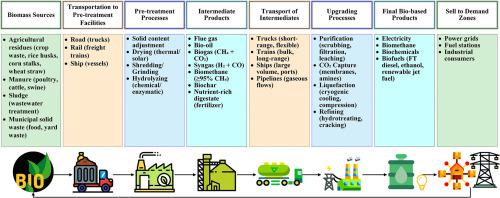可持续利用生物质的循环供应链
IF 3.9
2区 工程技术
Q2 COMPUTER SCIENCE, INTERDISCIPLINARY APPLICATIONS
引用次数: 0
摘要
可持续生物燃料和生物能源生产的一个重大障碍是在各种供应链设计、可用资源和工艺技术之间做出选择,特别是当可持续性是一个关键标准时。为了同时应对不断产生废物、不断增加的能源需求、高自然资源消耗和不断增加的温室气体排放的挑战,应加强生物基废物的利用。为生物废物处理提供经济和环境可持续的解决方案,需要为相关的供应链网络开发一个优化模型。本研究建立了一个数学模型,以优化规划和整合生物基废物供应链组成部分为一个协调系统。该模型使采购和供应与不同的需求保持一致,有效地为运营分配资源,优化生产水平,通过最佳运输网络计划交付,并减少生物质系统中运输和转换阶段的运营二氧化碳排放。结果表明,设计良好的供应链更具成本效益和效率,减少浪费的材料,并跟上需求的波动。它还减少了现有的风险,并确定了网络中的瓶颈。此外,分散式生物质处理允许本地化资源增值,并通过降低排放和运输成本提高供应链灵活性。使用较小的地理上分散的处理单元增加了系统的适应性,并减轻了原料可变性的风险。通过优化能源效率和经济可行性,这一战略不仅强化了循环生物经济原则,而且使可持续生物质消费更具可行性和可扩展性。本文章由计算机程序翻译,如有差异,请以英文原文为准。

Circular supply chains for sustainable use of biomass
A significant impediment to sustainable biofuel and bioenergy production is deciding between various supply chain designs, available resources, and process technologies, especially when sustainability is a key criterion. To simultaneously address the challenge of continuous waste generation, increasing energy demand, high natural resource consumption, and increasing greenhouse gas emissions, the use of biobased waste should be enhanced. Providing economical and environmentally sustainable solutions for biowaste processing necessitates developing an optimization model for the associated supply chain network. This study creates a mathematical model to optimally plan and integrate biobased waste supply chain components into a coordinated system. The model aligns the purchasing and supply with varying demands, effectively assigns resources to operations, optimizes the production levels, plans delivery through optimal transportation networks, and reduces operational CO₂ emissions from transport and conversion stages in biomass systems. The results indicate that a well-designed supply chain is more cost-effective and efficient, reduces wasted materials, and keeps up with demand fluctuations. It also diminishes the existing risks and identifies the bottlenecks in the network. Furthermore, decentralized biomass treatment allows localized resource valorization and improves supply chain flexibility by lowering emissions and transportation costs. Using smaller geographically dispersed processing units increases system adaptability and mitigates feedstock variability risks. By optimizing energy efficiency and economic viability, this strategy not only reinforces the circular bioeconomy principles but also makes sustainable biomass consumption more feasible and scalable.
求助全文
通过发布文献求助,成功后即可免费获取论文全文。
去求助
来源期刊

Computers & Chemical Engineering
工程技术-工程:化工
CiteScore
8.70
自引率
14.00%
发文量
374
审稿时长
70 days
期刊介绍:
Computers & Chemical Engineering is primarily a journal of record for new developments in the application of computing and systems technology to chemical engineering problems.
 求助内容:
求助内容: 应助结果提醒方式:
应助结果提醒方式:


